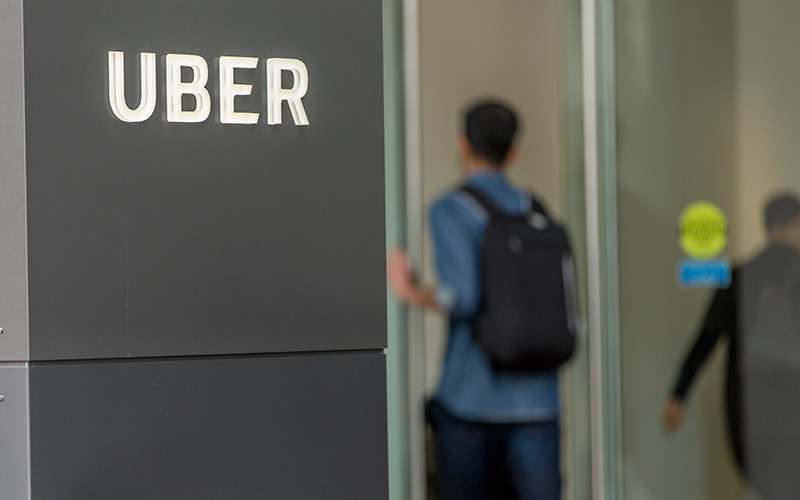Work and Pensions Committee calls for ‘worker’ status as default

The Work and Pensions Committee (WPC) has called on government to close legislation loopholes, which it claims enable “bogus” self-employment practices.
Private driver hire firm Uber is one example of the new breed of 'gig' employers
This is according to a WPC report, published yesterday, as part of an inquiry that had to be curtailed due to June’s forthcoming general election in which the committee heard from ‘gig economy’ companies like Uber, Amazon, Hermes and Deliveroo, and from drivers who work with them.
The gig economy is characterised by the prevalence of short-term contracts or freelance work as opposed to permanent jobs.
Early last month, the WPC published the contracts it had received from Uber, Hermes, Deliveroo and Amazon as part of the inquiry. The move followed on from an evidence session earlier this year, where the committee highlighted problems with clauses contained in the contracts of some of these companies. These ranged from being “unintelligible” in the case of Uber, and requiring workers not to challenge their self-employed status in the cases of Uber, Deliveroo and Amazon.
The WPC found firms relying on self-employed workforces “frequently” promote the idea that flexible employment is contingent on self-employed status. The committee claims this is idea is a “fiction”.
Consequently, the WPC calls for:
• The assumption of the employment status of “worker” by default, rather than “self-employed” by default, which the committee argues would protect workers and the public purse, putting the onus on companies to provide basic safety net standards of rights and benefits to their workers. Companies wishing to deviate from this model would be required to argue the case for doing so.
• That the next government set out a roadmap to equalise employee and self-employed National Insurance Contributions (NICs).
• That the Department for Work and Pensions (DWP) support entrepreneurship without subsidising unprofitable self-employment, with the committee arguing the existing Minimum Income Floor (MIF) in Universal Credit fails to get this balance right and risks stifling viable new businesses. Consequently, the committee calls on the incoming government to urgently review the MIF with a view to the “realities of self-employment”. Until the review is completed, the committee says the MIF should not apply to self-employed Universal Credit claimants.
In response to the WPC’s findings, Uber said in a statement: “Almost all taxi and private hire drivers in the UK have been self-employed for decades, and with Uber they have more control over what they do. Licensed drivers who use our app are totally free to choose if, when and where they drive, with no shifts, minimum hours or uniforms.
“The vast majority of drivers who use Uber tell us they want to remain their own boss as that’s the main reason why they signed up to us in the first place. But we know drivers want more security too, which is why we are investing in a heavily discounted illness and injury cover offer for drivers with IPSE [The Association of Independent Professionals and the Self-Employed].”
In a company statement Deliveroo said: "Deliveroo is proud to offer well paid, flexible work to over 15,000 riders. Our riders on average earn well above the National Living Wage.
"We receive 10,000 rider applications every week because people are attracted to the flexible way of working that we offer.
"Before Deliveroo existed many workers in the food delivery business were paid in cash, in the black economy. All of our riders are registered to work legally and pay their taxes in the UK.
"Our principles are really clear: as we have consistently said, we want to offer riders flexibility as well as extra security. We are contributing to the Taylor Review and hope that employment law can be updated to better reflect modern ways of working.
"We are proud that Deliveroo is a genuine UK success story - our founders have chosen to invest and grow from the UK. We want to work with the next government to ensure that we can continue to grow and create more work in the UK."
Meanwhile, employment lawyer Christopher Tutton, partner at Constantine Law, told Recruiter the committee’s recommendations on employment status would have a “profound” impact on gig economy firms.
“This is principally because they will have to pay NICs for their workers, as well as give them at least 28 days’ paid holiday each year,” Tutton said.
“The increased cost will mean that gig economy companies will have to raise their prices if they are to maintain their current levels of profitability. Ultimately this will mean a greater cost for the consumer.”
But the recommendations could have a positive impact for recruitment agencies, Tutton adds: “Recruitment agencies that have seen themselves undercut by gig economy companies in recent years may view the proposals positively in that they should lead to a more level playing field.”
Also commenting on the report, Crawford Temple, CEO of employment intermediary trade body PRISM, said employment status needs to be governed by the spirit of the relationship, and not be exploited by either side.
“Any perception of flexibility for the worker must be backed up by a degree of choice over when to work, with no penalties when they don't,” he said. “This isn't happening in the gig economy and wasn't at mini-cabs firms around the country 30 years ago.”
Dr Sybille Steiner, partner solicitor at law firm Irwin Mitchell, described the proposal for a default employment status of ‘worker’ and the associated shift of the burden of proof onto businesses as an “interesting” proposal.
“However, at this stage, it is unclear which steps will actually be taken to address issues surrounding the ‘gig economy’ and it remains a ‘watch this space’ situation. Recruiters will have to insure that they follow these developments very carefully so that they can prepare for changes well in time and do not find themselves in breach of legal positions.”
According to Julia Kermode, CEO of The Freelancer & Contractor Services Association (FCSA), a trade association whose members provide professional support services to freelancers and contractors, said the onus is on employers to treat their workforces properly so that exploitation cannot happen, adding it is unacceptable that enforced self-employment puts vulnerable people at risk as legally they do not have any rights.
“Employers should not shirk their responsibilities to provide basic workers’ rights. However, I think it is important to point out that there is no evidence from the recent OBR Economic and Fiscal Outlook to show there is any tax loss to the public purse arising from increasing self-employment. And, whilst we must protect vulnerable workers, we should also be mindful that the vast majority of self-employed professionals choose to operate in this way and do not want or expect employment rights, nor do they feel exploited.”
However, Kermode also raised concerns that the committee’s move to redefine employment status might have a “significant” impact on genuine self-employed workers, adding: “It is important to consider all types of ‘workers’ before adding an extra layer of red tape or introducing any legislation that might hinder the UK’s self-employed professionals who are driving the UK economy right now.”
Parcel delivery firm Hermes told Recruiter they would not be commenting on the committee’s findings.
Amazon was also approached for comment. This story will be updated upon receipt of their statements.
• What are your views on this issue? Email us at [email protected] or tweet us below to tell us your thoughts. We will run comments online in a round-up at the end of the week.




